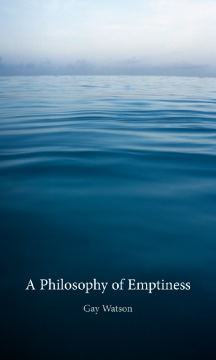
Additional Information
Book Details
Abstract
We often view emptiness as a negative condition, a symptom of depression, despair, or grief—an assessment furthered by authors like Franz Kafka or the existentialists, Jean-Paul Sartre and Albert Camus. Offering an alternative view, A Philosophy of Emptiness reclaims these hollow feelings as a positive and even empowering state, an antidote to the modern obsession with substance and foundation.
Digging through early and non-Western philosophy, Gay Watson uncovers a rich history of emptiness. She travels from Buddhism, Taoism, and religious mysticism to the contemporary world of philosophy, science, and art practice. Though most Western philosophies are concerned with substance and foundation, she finds that the twentieth century has seen a resurgence of emptiness and offers reasons why such an apparently unappealing concept has attracted modern musicians, artists, and scientists, as well as preeminent thinkers throughout the ages. Probing the idea of how a life without foundation might be lived—and why a person might choose this path—A Philosophy of Emptiness links these concepts to contemporary ideas of meditation and the mind, presenting a rich and intriguing take on the concept of emptiness and the history of thought.
“Ironically, Gay Watson’s book on emptiness is wonderfully full. It’s overflowing with clarity, insight, dry humor, and sheer verve in its explorations of reality and our consciousness of it. It’s rare to find a book so saturated with scholarship to be also so encouraging and helpful for those whose interest in impermanence and interdependence is more than academic. This wide-ranging examination of existence and experience is both contemporary and likely to become a classic.”
— Rick Hanson, author of Buddha’s Brain: The Practical Neuroscience of Happiness, Love, and Wisdom
Gay Watson is the author of Beyond Happiness and The Resonance of Innocence, and coeditor of Psychology of Awakening. She lives in Devon, UK.
